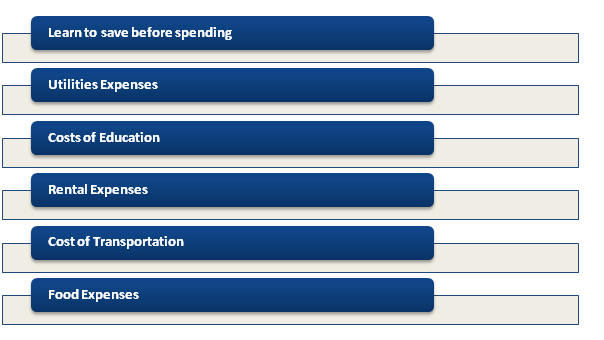The COVID-19 pandemic has claimed countless lives and has been going on for almost a year. Salaried employees in Dubai have run into financial difficulties due to a temporary loss of income. Making a livelihood with the income level has become quite challenging. You may eliminate unnecessary spending and make the best use of existing funds by carefully planning your wage income.
In the long run, once the epidemic situation has stabilized, you will benefit from acquiring the practice of maximizing income use. The most significant aspect of saving is that even a modest amount of money saved adds up over time.
In this blog, we've attempted to categorize expenses for the majority of paid employees in Dubai, UAE. However, it may vary significantly depending on an individual's earning capabilities and spending habits, but the general concepts should apply to practically all Dubai residents. So without any further ado, let’s learn.
Valuable Tips to follow for best outcomes
Below mentioned are the few areas in which you can make changes to maximize your savings game in Dubai-

LEARN TO SAVE BEFORE SPENDING
Expats in Dubai believe that saving money is one of the most challenging jobs they face with their salary income. In most cases, when a salary is credited, saving first and then spending is a wise strategy to follow. It may be tough to conserve your lower wage if you have a temporary salary deduction. You can ask the bank to deduct a percentage of your salary and deposit it in your savings account automatically.
Let's look at an example to see where you can save money and where you can cut costs. Consider an individual who earns AED 10,000 per month and has a small household with a school-aged child. Budgeting for the month should begin with unavoidable spending and then move on to other expenses.
Assume that the family also has car expenses, as well as credit card payment and usage expenses. To live a respectable life in Dubai, essential living expenses such as rent, transportation, food, education, utility expenses, and credit cards should be kept well within the budget.
UTILITIES EXPENSES
Expenses for electricity, water, and gas are unavoidable, and these costs will range from AED 1000 to AED 1500. There are a few other expenses, such as television channels and the internet that have alternatives. It is necessary to have access to the internet, but having access to more than 200 stations on television is not required, and you will not watch all of them. You can watch all of the channels if you have an internet connection. You can access all internet broadcasts, including entertainment and news from around the world, for AED 200 or less.
COSTS OF EDUCATION
Student school expenses are the most expensive monthly expense for many residents and expats. Expats send their children to school in their native country to save money on schooling. Fees for school-aged children can range from AED 10,000 to AED 100,000 per year. Do not spend more than 15% of your earnings on educational fees that could immediately affect your budget.
As the child develops, the expenses will inevitably rise, and you should budget accordingly. If you force your child to live with you, you must plan for future expenses and budget your pay accordingly.
RENTAL EXPENSES
A general rule is that you should pay 30 percent or less toward rent each month, but numerous surveys in the UAE show that this is not the case. For the past few years, many residents have been exempt from the 30% restriction. For this wage range, the most realistic estimate is 35 percent to 45 percent of monthly revenue. Consider a 35 percent deduction from a salary of AED 10,000, resulting in AED 3,500 for rental charges.
In a few areas of Dubai, it is suitable for a single bedroom occupation. In comparison, a family may get a two-bedroom apartment in Sharjah for this sum. Rent is one of the most important aspects to consider for those who work and live in different emirates. If your rental costs exceed the above-mentioned range, you should reconsider your options. Single bed rooms and studios are an excellent choice for small families. Dormitory or sharing rooms are the best option for students and bachelors, albeit they may be overcrowded in some areas.
COSTS OF TRANSPORTATION
The next expense will be transportation, which will include trips from the office to work and other commuting. Owning a car in Dubai is easier and more economical than in any other country. Used and new trustworthy branded cars are also available at reasonable prices here. If you own a car, you must budget for additional expenses such as annual maintenance, insurance, parking fees, and other fees. If you break the traffic laws or commit a parking infraction, you will face a stiff penalty ranging from AED 600 to AED 5000. If you break the guidelines, you will lose your entire monthly budget.
In Dubai, taking public transit is the best option. Almost all of the cities are connected by the metro. If you live near a metro station, you can save money on parking, petrol, and other expenses by commuting to work and home by metro. Because there are no metro services accessible in Abu Dhabi and Sharjah, having a car is the best option if you wish to live in these areas. If your firm provides pick-up and drop-off services, you can save money by using that vehicle or public transit.
Your car's fuel, parking, and other maintenance charges should not exceed 15% to 20% of your monthly salary. The amount ranges from AED 1500 to AED 2000, based on the example we've used. You can purchase used cars in excellent shape that have been driven a short distance. There is another significant aspect to consider if you are travelling by car: the Salik. The cost of salik or tolls becomes a hardship that might put a strain on your finances. Make sure you're familiar with all of the salik-free roads leading to your location. The cost of salik to and from is estimated to be roughly AED 16, and it can be used in an emergency.
If you solely plan to travel by bus and train, your transportation costs could be as low as AED 230 to AED 1000. If you spend more than 20% of your monthly salary on commuting, you should reconsider and look for other possibilities to live a financially balanced life.
FOOD EXPENSES
The cost of food is the next most important factor. Food expenses can be inexpensive if you have the mindset of spending wisely on food. A good rule of thumb is to always prepare food at home to save money on food. If you do this, you will spend less than AED 1000 on groceries and other food expenses, which is 10% of your allotted amount.
Keep an eye out for special offers and take advantage of them. Food coupons, weekend grocery deals, and supermarket discounts are all accessible; all you need is your attention and time to take advantage of them. Food sale dates are provided by some supermarkets.
Simply take advantage of the offer and save money on your budget. Because life in Dubai is hectic and cooking for every meal may be challenging, consider a little dining out or ordering food to be delivered to your home. Choose the greatest dining offers on credit cards or coupons; if you shop around, you'll almost certainly find a fantastic deal.
Conclusion
If you carefully budget your salary income, reduce costs, and make the greatest use of available money, you can live a decent life. If you're still having trouble covering your bills, try looking for new career options that pay well. Prefer firms that provide both lodging and transportation, as this will save you money. To live a happy life, make the greatest use of your money and the chances available to you. When you're trying to save money, don't forget to live in the moment. We hope this blog provided you with incite full information. For more information on other related aspects, feel free to checkout our Website as well.

